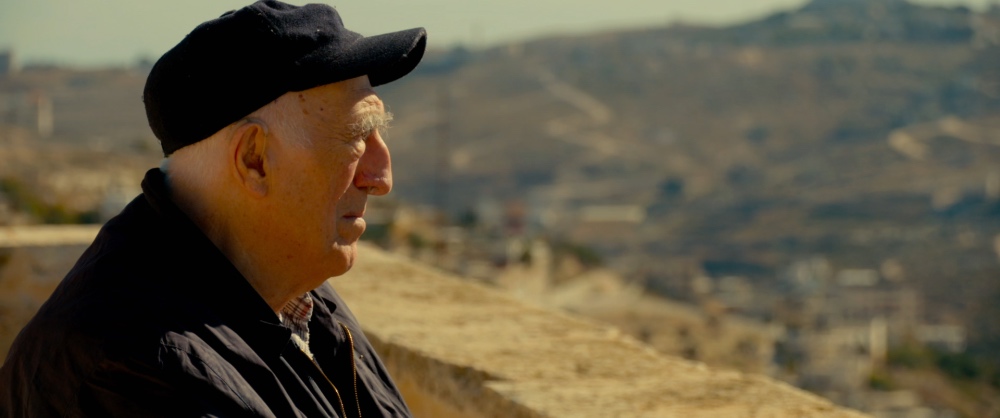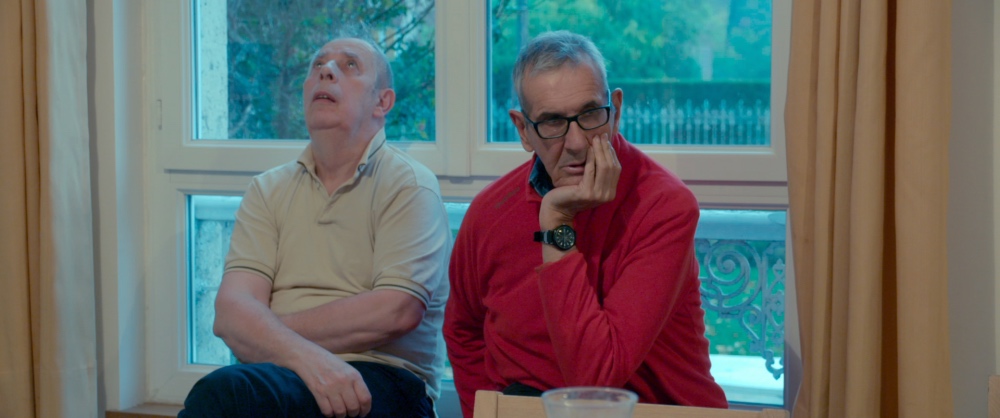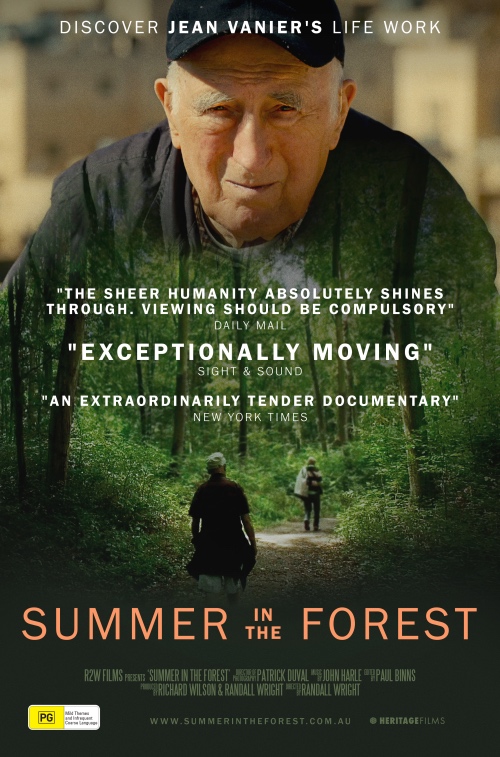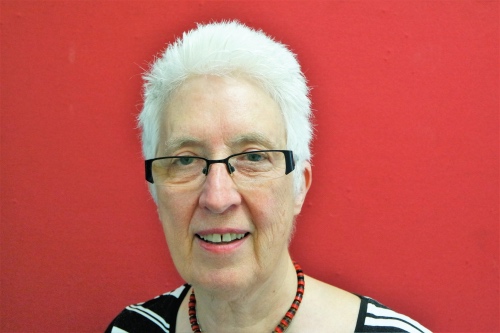
DAVID ADAMS speaks with Eileen Glass of Australia’s L’Arche community about a new film, ‘Summer in the Forest’, which provides a glimpse into the lives of some of those involved in the organisation’s communal living initiatives...
A global network of communities where people with intellectual disabilities live side-by-side with those without, L’Arche has, at its heart, a simple premise: that relationships between people is the key to living out the Gospel.
That concept of relationship lies at the heart of a new documentary film, Summer in the Forest, based on the organisation’s founder Jean Vanier, now aged in his 80s, and those who live with him in the first community he established in the village of Trosly-Breuil in France.
“It’s purpose was to try and capture the relationship at the heart of L’Arche, which is the relationship between the person with and [the person] without a disability,” explains Eileen Glass. Glass, a key member of the L’Arche community in Australia, was the first Australian to hold the post of the organisation’s Vice-International Leader – a role which saw her serve as liaison between the film’s director Randall Wallace and the organisation during the making of the documentary.
“I think it raises questions about…what is it to be human and live a faithful relationship in this world that’s fragmenting, that’s increasingly fearful of diversity which, in its mechanisms, is pushing people into positions of loneliness.”

Patrick and Andre, two of the men who appear in the film, ‘Summer in the Forest’. PICTURE: All images supplied.
The origins of L’Arche (the name means “The Ark” in French) go back to 1964 when Vanier – the fourth child of Georges Vanier, a Canadian diplomat and Canada’s Governor-General between 1959 and 1967 – found himself in France in search of a “different life” after leaving behind a eight year career in both the British and Canadian navies.
Encouraged by a friend, Catholic priest Fr Thomas Philippe, he invited two men with intellectual disabilities – Raphael Simi and Philippe Seux – to leave the institution they were living in in southern Paris and move into his home in Trosly-Breuil.

“People with a disability experience a real transformation and discover confidence in themselves; they discover their capacity to make choices, and also find a certain liberty and above all their dignity as human beings.”
– Jean Vanier
While that original community now involves more than 100 people living in 10 different homes and work settings, the International Federation of L’Arche, which though founded in the Christian Gospel includes people of other faiths, now boasts 5,000 members with more than 150 communities located on all five continents.
These communities can vary in form and size and may comprise one or several households where people with and without disabilities (the latter are known as “assistants”) share their lives.
“Our community life is beautiful and intense, a source of life for everyone,” says Vanier – who has won a host of awards for his work including the French Legion of Honour, Companion of the Order of Canada and the 2015 Templeton Prize – in comments released with the film.
“People with a disability experience a real transformation and discover confidence in themselves; they discover their capacity to make choices, and also find a certain liberty and, above all, their dignity as human beings.”
Glass, who had been raised as a Catholic but became disillusioned with the institutional church as a young person, first visited the Trosly-Breuil community in 1974 while travelling the world and was deeply impacted by Vanier and what she found there.“I was a young person who’d been at university in the late 60s in the foment of the expressive revolution…and we were going to change the world. And at L’Arche I was confronted with another way of changing the world, really,” she says.
“I was confronted with something that challenged the rhetoric of that political movement of the Sixties… because if you’re really going to change the world and create a world where everyone belongs, then you have to be prepared to align yourself with people who don’t belong, people who are put on the margins. And to live with them, to share life with them in communal households, is really to put yourself in the position where your vulnerability will be exposed, your powerlessness will become evident and you will be changed by the encounter. “
Glass describes it as a “radical way to live the Gospel”.
“[I]t felt so authentic to me,” she says of her experience at Trosly-Breuil.
Glass went on to spend two years living in another L’Arche community – this one in Winnipeg in Canada before she returned to Australia where she was involved in establishing the country’s first L’Arche community in the Canberra area in 1978.
There are now five established L’Arche communities in Australia – in Brisbane, Sydney, Canberra, Melbourne and Hobart – and four communities in development as well as a “seed group” in Alice Springs.

Jean Vanier, founder of L’Arche communities.
Glass, who was awarded an Order of Australia for her work with L’Arche in 1996, says her experience of being involved with L’Arche has dramatically impacted her faith.
“The first thing that comes to mind is that I have learnt to read the Gospel from the underside and I think that’s really, really important because if the Gospel is not good news to the people most vulnerable and most on the edges, it is not Gospel,” she says. “And so in order to do that, I have to be connected to those people, I have to share life with them.”
Now 70-years-old, Glass says being part of L’Arche has also opened her up to the “diversity of the people of God”.

“L’Arche is in 38 countries and that’s incredible diversity around the world in terms of culture, religion, attitude to disability, language, everything that goes with it…[T]o hold that diversity, it shapes faith, it shapes a vision of the people of God – who we are and what it means to build a world where everyone belongs, to work for peace. That’s been a really fundamental movement in my journey.”
– Eileen Glass
“L’Arche is in 38 countries and that’s incredible diversity around the world in terms of culture, religion, attitude to disability, language, [and] everything that goes with it…[T]o hold that diversity, it shapes faith, it shapes a vision of the people of God – who we are and what it means to build a world where everyone belongs, to work for peace. That’s been a really fundamental movement in my journey.”
Glass says that while the film – which is based around the community in Trosly-Breuil but a longer version of which (available later on DVD) also includes footage from a L’Arche community in Bethlehem – will appeal to people involved in faith communities and particularly those “asking questions about what it is to live the Gospel in our time”.
But she also believes it could be useful for people working in the disability sector to watch “just for a different vision”.
Glass says, for example, that one issue which is a big part of what L’Arche is about but which “in the world of NDIS [Australia’s National Disability Insurance Scheme] and service provision, other people don’t talk about so clearly” is to consider the contribution of the person with an intellectual disability.
“We can be very focused on rights and that’s important but we need, if we’re going to build a more human society; we need to move further than simply the question of rights to the question of ‘what is the unrepeatable grace of this life, that if we don’t receive it, we’re all the poorer for it?’” she says.
Glass adds that while there is a much greater awareness of issues around disability these days, the fundamentals can sometimes be overlooked.
“We talk a lot about a personal agency, independent choice, independent living and all of that and we forget that fundamentally as human beings we are relational. And you can’t legislate good relationships between people with and without disability…[T]hat’s a choice, that’s a discovery, that’s a commitment to be faithful to a person.”
‘Summer In The Forest’ is being released nationally in Australian cinemas on 29th April. For more information on screenings, head to www.summerintheforest.com.au/#screenings.





